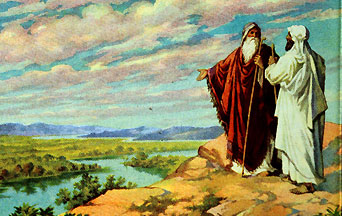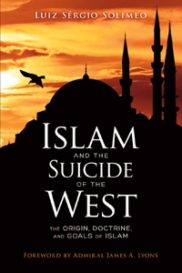
At the General Audience of April 3, to justify his marked sympathy for Islam Pope Francis repeated the cliché that “along with the Muslims, we are the descendants of the same Father, Abraham.”
Do All Religions “Always Look to Heaven; They Look to God”?
In that same statement, Pope Francis sought to counter criticism for his statement from Abu Dhabi that God wills the existence of various religions just as He wants diversity of race and sex.1
He went on to say in the General Audience that, the existence of many religions is willed by God, but by his permissive will. After asking himself “why does God allow many religions?” he replies that this is due “to God’s voluntas permissiva [permissive will],” adding that God “wanted to allow this reality: there are many religions.”2
He fails to explain that although God allows evil to exist in the world “partly that greater good may not be impeded, and partly that greater evil may not ensue,”3 He cannot be the cause, even indirectly, of any evil.
As Fr. Garrigou-Lagrange says, “the divine will cannot indeed, either directly or indirectly, will the disorder which is in sin, so neither can divine causality produce that disorder.”4
Pope Francis’s explanation is even more flawed as he adds that “Some [religions] are born from culture, but they always look to heaven; they look to God.”5
10 Razones Por las Cuales el “Matrimonio” Homosexual es Dañino y tiene que Ser Desaprobado
The phrase is very ambiguous because false religions cannot seek Heaven and God correctly and efficiently. Otherwise, the necessary conclusion would be that all of them are good and salvific. If that were so, all of them would exist not by pure permission from God but by His positive will and desire. Yet, this is the meaning of the disputed sentence in the Abu Dhabi document that caused great scandal for presenting a God contradictory unto Himself by wanting both good and evil, truth and error.
A Myth Created by a “Muslim-Catholic” Priest
The false conception that there are three monotheistic religions—Judaism, Christianity, and Islam6—and that they have a common origin in the Patriarch Abraham was created or at least spread by a pseudo-mystical French priest, Fr. Louis Massignon (1883–1962).7 He was such an Islamophile that when Pope Pius XI received him in audience on July 18, 1934, he maliciously called him a “Muslim-Catholic.”8

FREE READ: Islam and the Suicide of the West
The theories of Louis Massignon influenced the Second Vatican Council.9
Abraham, the Father of Different Religions?
Fr. Charles Jourdan, CMJ, a French priest and Islamicist, asks, “How can Abraham be the father of different religions? Under what title is Abraham a father in the faith? Of which Abraham are we children?”10
He goes on to explain that Islam is more appropriately termed an “Adamic religion,” since it considers Adam to have been the first monotheistic prophet: “For Muslims, the first monotheist in history is Adam. But, Shh! Don’t say this out loud! Nevertheless, Islam is fundamentally Adamic, ‘the religion of always.’ It is not Abrahamic.”11
In his turn, Fr. Antoine Moussali, also an Islamicist, shows that there is nothing in common between the Abraham we know from Sacred Scripture, to whom God’s promise was fulfilled in Jesus Christ, and Islam’s Abraham. In the Koran, Abraham appears as the defender of the oneness of God (not Trinitarian), and therefore as a typical Muslim.12
Eternal and Natural Law: The Foundation of Morals and Law
The only common trait between the Abraham of the promise and that of Islam, Fr. Moussali explains, is the name itself: “Spiritually and theologically speaking, they are radically different. Indeed, there is a great distance between the character of the covenant and the promise, open to the future [coming of Christ] and the one whose mission was only to re-establish the ‘primitive’ religion. . . the norm of natural religion.”13
Lack of Basis in Historical-Genealogical Studies
The alleged affiliation of Muslims to Abraham lacks not only a biblical-theological basis but also a genealogical-historical one. A study by Fr. René Dagorn shows that the Arabs, before their contact with the Jews, were unaware of the existence of Ishmael, from whom they are claimed to descend.
In the conclusion of his book, Fr. Dagorn states: “This examination, almost exclusively based on the meticulous analysis of Arabian genealogical works and the oldest Muslim tradition, leads us to formally conclude the absolute and radical non-existence of Ishmael, Hagar, his mother, and even Abraham in the pre-Islamic Arab tradition.”14
He insists that since the Arabs didn’t preserve “the historical memory of a carnal and even spiritual attachment to Abraham through his Ishmaelite lineage,” it is absurd to use such a basis, “which in fact does not exist at all, for pseudo-theological or mystical deductions concerning the origins of Islam.”15
Learn All About the Prophecies of Our Lady of Good Success About Our Times
The True Children of Abraham
The true children of Abraham are those who do the works of Abraham, those who accept the fulfillment of the promise made to the Patriarch in Jesus Christ Our Lord.
Thus, Saint Paul tells the Galatians, “For you are all the children of God by faith, in Christ Jesus. … And if you be Christ’s, then are you the seed of Abraham, heirs according to the promise” (Gal. 3:26, 29).
When the Scribes and Pharisees claimed to be Abraham’s children, Jesus answered them, “If you be the children of Abraham, do the works of Abraham. But now you seek to kill me, a man who have spoken the truth to you, which I have heard of God. This Abraham did not” (John 8: 39–40).
Should We Preach Fraternity or the Gospel?
At the same public audience, Pope Francis said, “But what God wants is fraternity among us and in a special way … with our brothers, Abraham’s children like us, the Muslims.”
Our Lord Jesus Christ did not commission the Apostles to preach fraternity among all religions, but rather: “Going therefore, teach ye all nations; baptizing them in the name of the Father, and of the Son, and of the Holy Ghost. Teaching them to observe all things whatsoever I have commanded you” (Matt. 28:19–20).
This is the mission of the successors of the Apostles, and especially the Pope, the successor of Saint Peter. Unfortunately, it is not what we see in the regrettable days in which we live. May God in his mercy have pity on us and shorten these days.
Footnotes
- Luiz Sérgio Solimeo, “Theological and Canonical Implications of the Declaration Signed by Pope Francis in Abu Dhabi,” TFP.org, Feb. 27, 2019, https://tfp.org/theological-and-canonical-implications-of-the-declaration-signed-by-pope-francis-in-abu-dhabi/.
- Francis, “General Audience” Apr. 3, 2019, Vatican.va, http://w2.vatican.va/content/francesco/en/audiences/2019/documents/papa-francesco_20190403_udienza-generale.html.
- Leo XIII, Encyclical Libertas praestantissima, Vatican.va, Jun. 20, 1888, no. 33, http://w2.vatican.va/content/leo-xiii/en/encyclicals/documents/hf_l-xiii_enc_20061888_libertas.html.
- Reginald Garrigou-Lagrange, O.P., Reality: A Synthesis of Thomistic Thought, accessed Apr. 12, 2019, https://www.ewtn.com/library/theology/reality.htm.
- Francis, “General Audience.” (My emphasis.)
- Jewish and Muslim monotheism deny the Holy Trinity. Therefore they cannot be common to Christian monotheism: “The Trinity is the very essence of God”, as emphasized by Fr. Antoine Moussali. See La Croix et le Croissant, (Paris: Éditions de Paris, 1998), 19.
- See Louis Massignon, Annuaire du Monde Musulman (Paris: Presses Universitaires de France, 1955), 217.
- Lorenzo Perrone, “‘Abraham, Père de Tous les Croyants’ Louis Massignon et l’Apostolat de la Prière,” Proche-Orient Chrétien, 60, 2010, 106, http://www.academia.edu/1287868/_Abraham_p%C3%A8re_de_tous_les_croyants_Louis_Massignon_et_l_%C5%93cum%C3%A9nisme_de_la_pri%C3%A8re. See Luiz Sérgio Solimeo, Islam and the Suicide of the West (Spring Grove, Penn.: The American Society for the Defense of Tradition Family and Property, 2018), chs. 12 and 18.
- See Christian S. Krokus, “Louis Massignon’s influence on the teaching of Vatican II on Muslims and Islam,” Islam and Christian–Muslim Relations, vol. 23, 2012, Issue 3, 329–345, Jun. 22, 2012, http://www.tandfonline.com/doi/abs/10.1080/09596410.2012.686264; Neal Robinson, “Massignon, Vatican II and Islam as an Abrahamic religion,” Islam and Christian–Muslim Relations, vol. 2, 1991, Issue 2, 182-205, Apr. 18, 2007, accessed Mar. 1, 2018, http://www.tandfonline.com/doi/abs/10.1080/09596419108720957?src=recsys.
- François Jourdan, Dieu des Chrétiens, Dieu des Musulmans: Des repères pour comprendre (Paris: Éditions de L’Oeuvre, 2008), 42.
- Eléonore de Vulpillières, “Islam et christianisme: Les impasses du dialogue interreligieux−L’islamologue François Jourdan revient sur les différences spécifiques qui distinguent l’islam du christianisme,” Le Figaro, Jan. 22, 2016, http://www.lefigaro.fr/vox/religion/2016/01/22/31004-20160122ARTFIG00344-islam-et-christianisme-les-impasses-du-dialogue-interreligieux.php.
- Antoine Moussali, La Croix et le croissant (Paris: Éditions de Paris, 1998), 50–55.
- Ibid., 55.
- René Dagorn, La geste d’Ismael d’après l’onommastique et la tradition arabes (Geneva: Librairie Droz, 1981), 377.
- Ibid.
